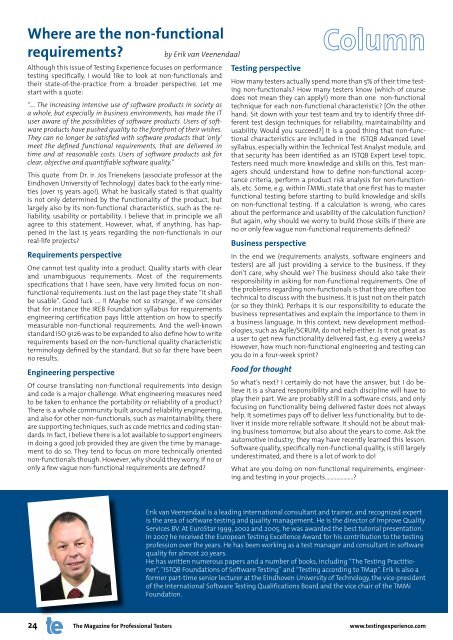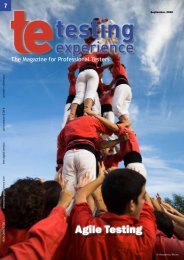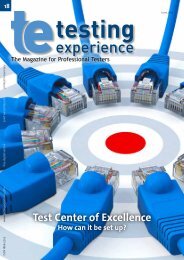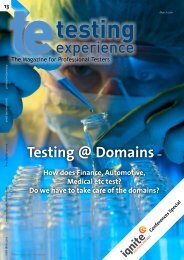Agile Performance Testing - Testing Experience
Agile Performance Testing - Testing Experience
Agile Performance Testing - Testing Experience
Create successful ePaper yourself
Turn your PDF publications into a flip-book with our unique Google optimized e-Paper software.
Where are the non-functional<br />
requirements?<br />
Although this issue of <strong>Testing</strong> <strong>Experience</strong> focuses on performance<br />
testing specifically, I would like to look at non-functionals and<br />
their state-of-the-practice from a broader perspective. Let me<br />
start with a quote:<br />
“…. The increasing intensive use of software products in society as<br />
a whole, but especially in business environments, has made the IT<br />
user aware of the possibilities of software products. Users of software<br />
products have pushed quality to the forefront of their wishes.<br />
They can no longer be satisfied with software products that ‘only’<br />
meet the defined functional requirements, that are delivered in<br />
time and at reasonable costs. Users of software products ask for<br />
clear, objective and quantifiable software quality.”<br />
This quote from Dr. ir. Jos Trienekens (associate professor at the<br />
Eindhoven University of Technology) dates back to the early nineties<br />
(over 15 years ago!). What he basically stated is that quality<br />
is not only determined by the functionality of the product, but<br />
largely also by its non-functional characteristics, such as the reliability,<br />
usability or portability. I believe that in principle we all<br />
agree to this statement. However, what, if anything, has happened<br />
in the last 15 years regarding the non-functionals in our<br />
real-life projects?<br />
Requirements perspective<br />
One cannot test quality into a product. Quality starts with clear<br />
and unambiguous requirements. Most of the requirements<br />
specifications that I have seen, have very limited focus on nonfunctional<br />
requirements. Just on the last page they state “it shall<br />
be usable”. Good luck …. !! Maybe not so strange, if we consider<br />
that for instance the IREB Foundation syllabus for requirements<br />
engineering certification pays little attention on how to specify<br />
measurable non-functional requirements. And the well-known<br />
standard ISO 9126 was to be expanded to also define how to write<br />
requirements based on the non-functional quality characteristic<br />
terminology defined by the standard. But so far there have been<br />
no results.<br />
Engineering perspective<br />
by Erik van Veenendaal<br />
Of course translating non-functional requirements into design<br />
and code is a major challenge. What engineering measures need<br />
to be taken to enhance the portability or reliability of a product?<br />
There is a whole community built around reliability engineering,<br />
and also for other non-functionals, such as maintainability, there<br />
are supporting techniques, such as code metrics and coding standards.<br />
In fact, I believe there is a lot available to support engineers<br />
in doing a good job provided they are given the time by management<br />
to do so. They tend to focus on more technically oriented<br />
non-functionals though. However, why should they worry, if no or<br />
only a few vague non-functional requirements are defined?<br />
<strong>Testing</strong> perspective<br />
How many testers actually spend more than 5% of their time testing<br />
non-functionals? How many testers know (which of course<br />
does not mean they can apply!) more than one non-functional<br />
technique for each non-functional characteristic? [On the other<br />
hand: Sit down with your test team and try to identify three different<br />
test design techniques for reliability, maintainability and<br />
usability. Would you succeed?] It is a good thing that non-functional<br />
characteristics are included in the ISTQB Advanced Level<br />
syllabus, especially within the Technical Test Analyst module, and<br />
that security has been identified as an ISTQB Expert Level topic.<br />
Testers need much more knowledge and skills on this. Test managers<br />
should understand how to define non-functional acceptance<br />
criteria, perform a product risk analysis for non-functionals,<br />
etc. Some, e.g. within TMMi, state that one first has to master<br />
functional testing before starting to build knowledge and skills<br />
on non-functional testing. If a calculation is wrong, who cares<br />
about the performance and usability of the calculation function?<br />
But again, why should we worry to build those skills if there are<br />
no or only few vague non-functional requirements defined?<br />
Business perspective<br />
In the end we (requirements analysts, software engineers and<br />
testers) are all just providing a service to the business. If they<br />
don’t care, why should we? The business should also take their<br />
responsibility in asking for non-functional requirements. One of<br />
the problems regarding non-functionals is that they are often too<br />
technical to discuss with the business. It is just not on their patch<br />
(or so they think). Perhaps it is our responsibility to educate the<br />
business representatives and explain the importance to them in<br />
a business language. In this context, new development methodologies,<br />
such as <strong>Agile</strong>/SCRUM, do not help either. Is it not great as<br />
a user to get new functionality delivered fast, e.g. every 4 weeks?<br />
However, how much non-functional engineering and testing can<br />
you do in a four-week sprint?<br />
Food for thought<br />
So what’s next? I certainly do not have the answer, but I do believe<br />
it is a shared responsibility and each discipline will have to<br />
play their part. We are probably still in a software crisis, and only<br />
focusing on functionality being delivered faster does not always<br />
help. It sometimes pays off to deliver less functionality, but to deliver<br />
it inside more reliable software. It should not be about making<br />
business tomorrow, but also about the years to come. Ask the<br />
automotive industry; they may have recently learned this lesson.<br />
Software quality, specifically non-functional quality, is still largely<br />
underestimated, and there is a lot of work to do!<br />
What are you doing on non-functional requirements, engineering<br />
and testing in your projects………………..?<br />
Erik van Veenendaal is a leading international consultant and trainer, and recognized expert<br />
is the area of software testing and quality management. He is the director of Improve Quality<br />
Services BV. At EuroStar 1999, 2002 and 2005, he was awarded the best tutorial presentation.<br />
In 2007 he received the European <strong>Testing</strong> Excellence Award for his contribution to the testing<br />
profession over the years. He has been working as a test manager and consultant in software<br />
quality for almost 20 years.<br />
He has written numerous papers and a number of books, including “The <strong>Testing</strong> Practitioner”,<br />
“ISTQB Foundations of Software <strong>Testing</strong>” and “<strong>Testing</strong> according to TMap”. Erik is also a<br />
former part-time senior lecturer at the Eindhoven University of Technology, the vice-president<br />
of the International Software <strong>Testing</strong> Qualifications Board and the vice chair of the TMMi<br />
Foundation.<br />
24 The Magazine for Professional Testers www.testingexperience.com









